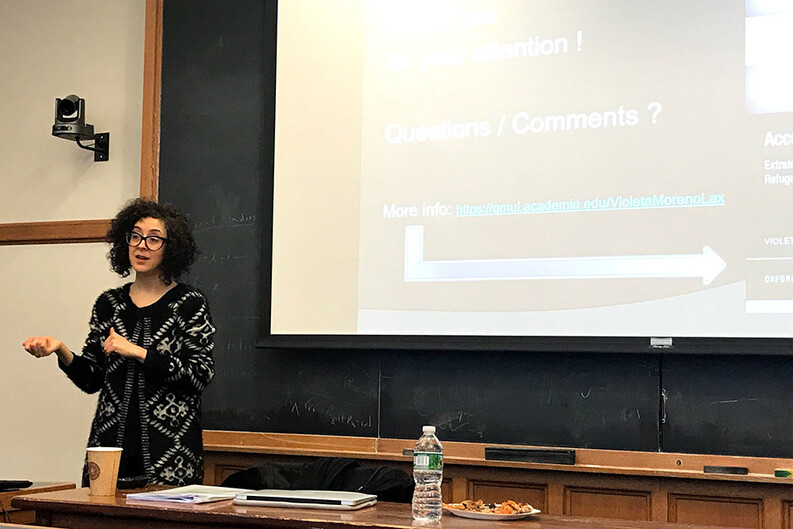Human Rights Experts Denounce the “Extraterritorialization” of Migration Controls

The Schell Center recently hosted two European human rights scholars, who discussed efforts by Western states to deter migration and suggested potential legal avenues for stopping these tactics.
At the February 7, 2019 Human Rights Workshop, Professor Martina Caroni L.L.M. ’01, who teaches law at the University of Lucerne in Switzerland, argued that powerful Western countries are taking an “out of sight, out of mind” attitude toward refugees and migrants who are trying to reach their borders. Such countries insist that refugee law is important to them, and yet, she said, they do whatever they can to keep migrants away from their borders, “in order to avoid difficult border decisions.”
Dr. Violeta Moreno, Senior Lecturer in Law and Co-Director of the Centre for European and International Legal Affairs (CEILA) at Queen Mary University of London, made a similar argument in her talk on February 20, 2019. Like Caroni, Moreno criticized the external migration controls that Western states use to deter the arrivals of refugees and migrants. These controls include detaining migrants and asylum-seekers in airports or other international transit zones, reaching agreements on travel-control measures with migrants’ home states or countries through which migrants pass on their way to their desired destinations, and intercepting boats on international waters and returning migrants to their ports of departure. Both Caroni and Moreno criticized Italy for, in effect, creating a Libyan coast guard and providing it with equipment, training and logistical support to “do interdictions at sea on behalf of the Italian government,” as Moreno said.
To Caroni, by externalizing their migration controls, Western states are “contracting out their international obligations” to other states that are either not party to the Refugee Convention (including Libya, Indonesia, Malaysia, Thailand, and Lebanon) or unwilling to fulfill their duties of international protection. Caroni called this practice “pernicious and perfidious.”
Caroni and Moreno both noted that a challenge to countering these practices is a set of gaps in international human rights law’s protections for refugees and migrants. Human rights law enshrines the principle of family unity and the prohibition of torture, and the Refugee Convention guarantees the right to non-refoulement. But international law offers no legally binding rights to free movement across international borders or to asylum (the Universal Declaration of Human Rights (UDHR) guarantees the right to seek asylum, but the UDHR is not generally considered to legally bind states).
Because of these gaps, Caroni advocates holding states responsible by making the case that under international law, “Western countries are not free to do whatever they want to externalize human rights violations or violations of refugee law.” But she expressed doubts that this could be accomplished through the European Court of Human Rights, which has received a number of cases alleging state violations of the European Convention of Human Rights based on extraterritorial measures to stop migrants from reaching the continent. She suggested that the Court’s current composition and approach make it unlikely that it would rein in these practices by Italy and other European countries.
Moreno was more optimistic about using human rights law and, in particular, the European Court to protect refugees and migrants. She said that the Court had already proven to be a “pioneer in recognizing that human rights do apply extraterritorially and therefore that parties to international treaties must still enforce their obligations even in transit zones.” This means, Moreno contended, that the right to leave a country should function as any other right, in that destination countries must respect and protect it just as countries of origin must.
Moreno brought up several European Court cases, including Amuur v. France, which concerned a Somali family whose attempt to seek asylum in the Paris Orly Airport was denied by the French government on the grounds that international protections did not apply in international transit spaces. As Moreno summarized, the Court ruled that “states do have the right to control entry but have to do so in a way that aligns with their human rights obligations.” She also noted M.S.S. v. Belgium & Greece, which concerned an Afghan national (M.S.S.) who entered Europe through Greece but sought asylum in Belgium. Belgium expelled him, and while he was awaiting his asylum decision in Greece, he became homeless and destitute. The Court ruled that both Greece and Belgium had violated Article 3 of the European Convention on Human Rights in their treatment of M.S.S., which prohibits torture and inhuman and degrading treatment, as well as the extradition of individuals to states where they might suffer torture. Moreno contended that the decision implicitly recognized the right to leave one’s own country and escape serious harm and affirmed “positive duties for states of destination and departure.”
Although Moreno was hopeful about the European Court’s capacity to protect the rights of migrants and refugees, she expressed her worry that we will continue to see European states “push back their contact point with migrants farther and farther away and have more intermediaries until it’s hard to trace violations back to the real perpetrator.”
Ultimately, Moreno and Caroni argued that this trend could be stopped only if Western states rise to the occasion and enforce human rights. “To keep calling yourself a liberal democratic nation,” Moreno said, “you have to act in accordance with international obligations.”


